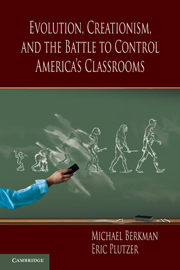Book contents
- Frontmatter
- Contents
- Figures
- Tables
- Acknowledgments
- Introduction
- 1 Who Should Decide What Children Are Taught?
- 2 The Public Speaks: “Teach Both”
- 3 A Nation Divided by Religion, Education, and Place
- 4 Is Evolution Fit for Polite Company? Science Standards in the American States
- 5 Teachers and What They Teach
- 6 State Standards Meet Street-Level Bureaucracy
- 7 When the Personal Becomes Pedagogical
- 8 Teachers in Their Schools and Communities
- 9 The Battle for America’s Classrooms
- Appendix to Chapter 2
- Appendix to Chapter 3
- Appendix to Chapter 4
- Appendix to Chapter 5
- Appendix to Chapter 6
- References
- Judicial Opinions and Court Cases Cited
- Index
- References
5 - Teachers and What They Teach
Published online by Cambridge University Press: 05 June 2012
- Frontmatter
- Contents
- Figures
- Tables
- Acknowledgments
- Introduction
- 1 Who Should Decide What Children Are Taught?
- 2 The Public Speaks: “Teach Both”
- 3 A Nation Divided by Religion, Education, and Place
- 4 Is Evolution Fit for Polite Company? Science Standards in the American States
- 5 Teachers and What They Teach
- 6 State Standards Meet Street-Level Bureaucracy
- 7 When the Personal Becomes Pedagogical
- 8 Teachers in Their Schools and Communities
- 9 The Battle for America’s Classrooms
- Appendix to Chapter 2
- Appendix to Chapter 3
- Appendix to Chapter 4
- Appendix to Chapter 5
- Appendix to Chapter 6
- References
- Judicial Opinions and Court Cases Cited
- Index
- References
Summary
One Hundred Years without Darwin Are Enough: When we say a thing is a fact, then, we only mean that its probability is an extremely high one: so high that we are not bothered by doubt about it and are ready to act accordingly. Now in this use of the term fact, the only proper one, evolution is a fact. For the evidence in favor of it is as voluminous, diverse, and convincing as in the case of any other well established fact of science concerning the existence of things that cannot be directly seen, such as atoms, neutrons, or solar gravitation…
Hermann J. Muller (1959)The scientific case against evolution: The fact that macroevolution (as distinct from microevolution) has never been observed would seem to exclude it from the domain of true science.
Henry M. Morris (2000)Our investigation into the politics of evolution and creationism has shown that, beginning with Epperson v. Arkansas (1968), U.S. federal courts have increasingly narrowed the range of acceptable public policies that state governments may enact concerning evolution. Today, states may choose to de-emphasize evolution in their curricula and select textbooks based on how extensively evolution is covered, so long as they do not also promote explicitly biblical creationism or “creation science.” In addition, although the district court decision in Kitzmiller v. Dover only serves as a legally binding precedent within the Middle District of Pennsylvania, it is likely to discourage efforts to introduce intelligent design into public school curricula elsewhere.
Nevertheless, we showed in the previous chapter that this narrowed range still allows for enormous diversity in state curricular standards, with some of this diversity being a reflection of public opinion (less rigorous standards where opinion is most opposed to teaching evolution). Where standards are more rigorous than public opinion might suggest (e.g., Indiana and North Carolina), we see evidence of the success of scientific organizations to get state educational bureaucracies to enact model curricula. In states whose curricula are not as sophisticated as the public might demand (e.g., Maine), the explanation may be due to state bureaucratic capacity and limited resources.
- Type
- Chapter
- Information
- Publisher: Cambridge University PressPrint publication year: 2010



